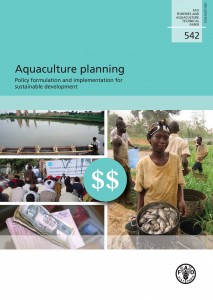As the aquaculture sector grows worldwide, appropriate planning has become fundamental to sustain its growth and contribution to poverty alleviation and economic development. Planning aquaculture development will stimulate and guide the evolution of the sector by providing incentives and safeguards, attracting investment and boosting development. It will help to ensure the long-term economic, environmental and social sustainability of the sector, and its ultimate contribution to economic growth and poverty alleviation. In 2010, with FAO colleagues and a team of consultants, we published a technical document providing practical guidance to aquaculture policy-makers and implementers on policy formulation and processes. This FAO Fisheries and Aquaculture Technical Paper starts by reviewing governance concepts and international policy agendas relevant to aquaculture development and proceeds by defining “policy”, “strategy” and “plan” while explaining common planning terminology. The paper proposes practical steps for improving policy formulation processes. These include: recognising a timely opportunity for change; ensuring coordination and communication among stakeholders; adopting a participatory approach; learning lessons from elsewhere; and accepting that conflicts may arise and lead to hard choices. It highlights means for implementing aquaculture policies, notes the benefits of an ecosystem approach and proposes a range of instruments which, if implemented at various levels, will help progress towards the development goals for the sector. However, the successful implementation of aquaculture policies depends on overcoming challenges related to weak human capacity, institutions and monitoring systems and to inadequate financial resources. Therefore, the paper also suggests the means to do so. Central to successful planning in the aquaculture sector are coherence in the planning process and an emphasis on interdisciplinarity beyond sectoral remit through institutional collaboration, human capacity development and participation. It is also necessary to embed the chosen approaches and instruments in the principles of good governance. Together, these key elements will ensure the soundness and effectiveness of aquaculture development policies and the positive contribution of the sector. The full document is available here.
Brugere, C., Ridler, N., Haylor, G., Macfadyen, G. and Hishamunda, N. (2010) Aquaculture planning: Policy formulation and implementation for sustainable development. FAO Fisheries and Aquaculture Technical Paper. No. 542. FAO, Rome. 70p.

